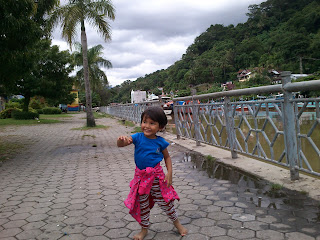Who do you think you are to judge my life. You know my name, not my story. You've heard what I've done, not what I've been through.
2013-04-15
Friendship ::: Western vs Eastern
Cross Cultural Understanding Essay
FRIENDSHIP (499 words)
Friendship is a relationship between two or more people who hold
mutual affection for each other. Friendship can be in the same or different
age, gender, status and environment. The term friend and friendship is
perceived differently in Indonesia and in Western countries. For example in
Western countries the term friend can be used to say someone whom
we have recently met in a party and enjoyed the time together. On the contrary,
in Indonesia people need to have intimate relationship to call someone as our
friend.
In indonesia, friendship is tend to be more dependent. Many people have their own group called friendship. There are two or more people in a group. The members usually come from same age, same gender and same interest. The intimacy among members is closer. They spend much time in group and share almost all topics. The members of the group feel loyal to their group. They treat the member of the group differently and do not ( difficult ) to accept new member. Mostly, friendship in Indonesia lasts longer and more personal.
Friendship in the Western countries is mostly pursued for pleasure. People tend to make friends with others whom they like, often people who share similar interests with them or who have been in the same organization such as workplace, club, etc. They prioritize self-concerns and interests and play a more social and casual role. They are also considered voluntary, unconstrained and spontaneous relationships with reciprocated warm and caring feelings.
In Western countries, friendship tend to be more independent because they have an individualistic culture. In individualistic cultures, “being a friend” may indicate someone whom we have recently met, enjoying good time together, or someone we have mutual dealings with. People in Western are more open toward new friendship and tend to have many friends in low intimacy. People can have more than one friend and usually grade them based on intimacy. There are four distinct levels of friendships. They are acquaintances, casual friends, good friends, and best friends.
Friendship in Western talk more about topics such as marriage, love or dating, and emotions. They are also talk about sex and similar interests. People in the Western countries do sometimes cultivate friendships in order to help their career or their business. This such friendships tend to be viewed as quite shallow and not seen as ‘real’ friendships.
In indonesia, friendship is tend to be more dependent. Many people have their own group called friendship. There are two or more people in a group. The members usually come from same age, same gender and same interest. The intimacy among members is closer. They spend much time in group and share almost all topics. The members of the group feel loyal to their group. They treat the member of the group differently and do not ( difficult ) to accept new member. Mostly, friendship in Indonesia lasts longer and more personal.
Friendship in the Western countries is mostly pursued for pleasure. People tend to make friends with others whom they like, often people who share similar interests with them or who have been in the same organization such as workplace, club, etc. They prioritize self-concerns and interests and play a more social and casual role. They are also considered voluntary, unconstrained and spontaneous relationships with reciprocated warm and caring feelings.
In Western countries, friendship tend to be more independent because they have an individualistic culture. In individualistic cultures, “being a friend” may indicate someone whom we have recently met, enjoying good time together, or someone we have mutual dealings with. People in Western are more open toward new friendship and tend to have many friends in low intimacy. People can have more than one friend and usually grade them based on intimacy. There are four distinct levels of friendships. They are acquaintances, casual friends, good friends, and best friends.
Friendship in Western talk more about topics such as marriage, love or dating, and emotions. They are also talk about sex and similar interests. People in the Western countries do sometimes cultivate friendships in order to help their career or their business. This such friendships tend to be viewed as quite shallow and not seen as ‘real’ friendships.
Friendship in Western matches the value of individualism, independence and respect. All differences beteween people such as gender, age and status become not so important when people share their similarities in a relation called friendship.
In every country, the term friendship is slightly different. The people who build friendship is also different. The reason to build friendship, the grade of intimacy, the topics we share to friends and the values of its are also different.
Bibliography
Young-Hoon
Kim, Chi-Yue Chiu, Siqing Peng, Huajian Cai and William TovJournal of Cross-
Cultural
Psychology, CUP: Sagecup, 2010
Yea-Wen
Chen & Masato Nakazawa, Journal of Intercultural Communication
Research, 2012
http://www.wikipedia.com
acceesed 26 March 2013
http://www.thewomaninchina.com/friendship-between-western-people.html accesed 26 March 2013
FRIENDSHIP
|
INDONESIA
|
WESTERN COUNTRIES
|
WHO
|
Children,
teenager, adult
|
Children,
teenager, adult
|
WHAT
|
Tetangga, kenalan,
kawan, teman, sahabat,
|
Acquitances,
casual friend, good friend, best friend, room-mate friend, partner
|
WHEN
|
Everytime ( most
of the time)
|
parties,
clubbing, walking at the park
|
WHERE
|
Everywhere ( at
the school, colleges, workplace etc )
|
in special places
such as park, night club,
|
WHY
|
for personal
purpose, dependent, high intimacy, share almost all topics, hard to accept
new friend, trustwothy, loyality
|
for pleasure
purpose, independent / individualistics, low intimacy, share limited topics,
open to accept new friend, not too reliable.
|
Subscribe to:
Comments (Atom)


